Traumatic brain injuries result from a sudden jolt or blow to the head, resulting in disruption of normal brain function. A mild traumatic brain injury could be a concussion, whereas a severe traumatic brain injury could result in permanent brain damage and lifelong disability. That’s why determining average settlement amounts is so complex.
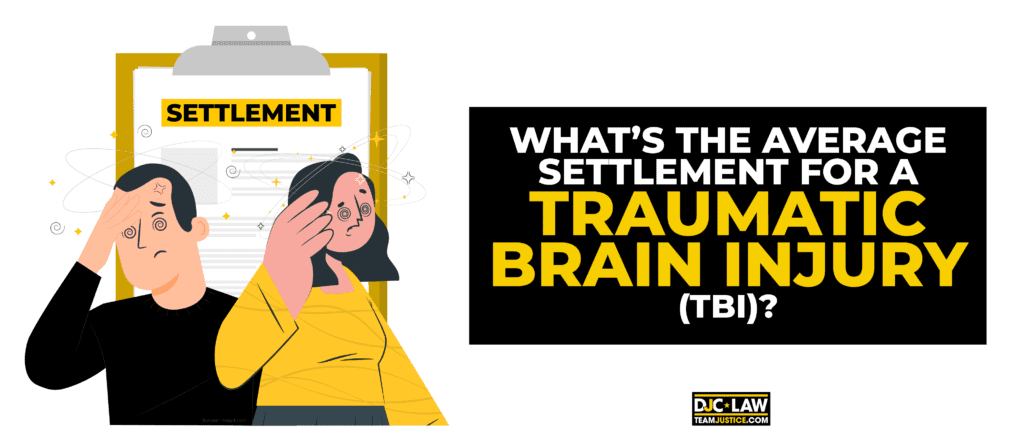
According to the International Brain Injury Association, one million Americans are treated and released from hospitals every year. Due to the nature of these injuries, settlements regularly run into six and seven figures. Like any personal injury lawsuit, how much you’re entitled to depends on the current and future impact of your injury.
Today, we’ll discuss how much you could be entitled to and what’s considered “average” for a TBI settlement.
Key Takeaways
Average settlement amounts for traumatic brain injuries range from $100,000 to over $5 million, with no upper limit on potential awards. However, averages vary wildly due to a minority of high-value cases.
Traumatic injuries range from mild to severe, with injuries incorporating everything from mild concussion to permanent brain damage.
Proving your injury and the extent of your injury is the key to getting the highest possible settlement award, with your lawyer relying on extensive medical evidence to build your case.
All economic and non-economic losses may be claimed as part of a traumatic brain injury lawsuit, including lost wages, medical costs, and pain and suffering.
Final settlement amounts are determined using the multiplier value, which is assigned a value of 1.5 to 5 and multiplied by your economic losses plus any additional damages pertinent to your situation.
Hire a lawyer to fight your traumatic brain injury case and ensure you get the highest possible settlement. They’ll ensure you avoid making any mistakes and can focus on your recovery while they maximize your eventual award.
How Much Money Can You Get from a Traumatic Brain Injury?
No caps exist on how much you could be entitled to if you have a brain injury. Like all personal injury lawsuits, the amount awarded largely depends on the extent of your injuries and the impact on your life. Not only can you put in a traumatic brain injury claim to cover your medical costs but also your pain and suffering, with the latter often making up more than half of the final settlement. Working with a personal injury lawyer near me ensures you have the expertise to pursue the full compensation you deserve.
Let’s see an example of how substantial brain injury settlements can become.
In 2024, the LA Times reported on a Corona del Mar High School football player who was awarded $31 million after sustaining a traumatic brain injury after slipping on the school’s natural turf. Despite wearing a helmet at the time, he was left with severe cognitive defects and emotional harm. Despite the significant award, the brain injury victim has been left with life-changing injuries.
It's no exaggeration to state that brain injuries are the most catastrophic injuries you can sustain because of how they can turn your life upside down permanently. All brain injuries are serious, which is why these types of cases commonly result in awards measured in millions.
What is an Average Settlement for a TBI?
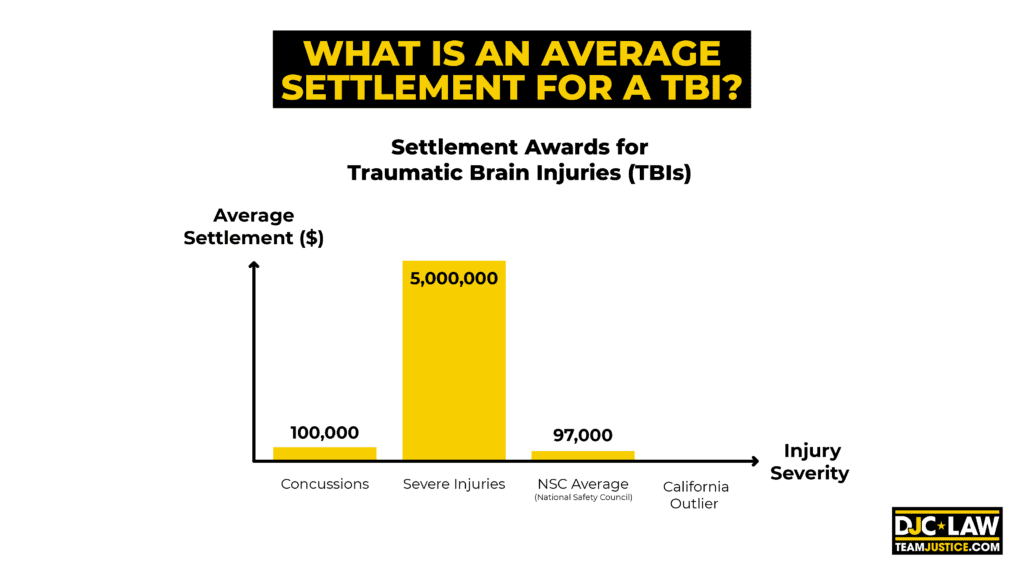
Settlement awards vary considerably, with settlements starting at $100,000 for injuries like concussions, with severe injuries resulting in average settlements of $5 million or more, especially if the victim requires long-term care.
How much an accident victim could receive depends on the economic and non-economic damages they sustained. These will include medical costs, lost earnings potential, property damage, and pain and suffering. Your settlement accounts for all tangible and intangible losses.
These scenarios are more common than you think, especially when the U.S. Centers for Disease Control (CDC) reports that 69,000 deaths are recorded annually due to TBIs. However, it must be noted that there is no true average because high-value cases tend to skew the overall numbers.
For example, the National Safety Council (NSC) reported an average settlement award for TBI-related cases in workers’ compensation lawsuits is $97,000. However, various law firms will also have their own figures. Moreover, some states have naturally higher averages, with California being an outlier in terms of high-value cases.
What Would Be Considered a Traumatic Brain Injury?
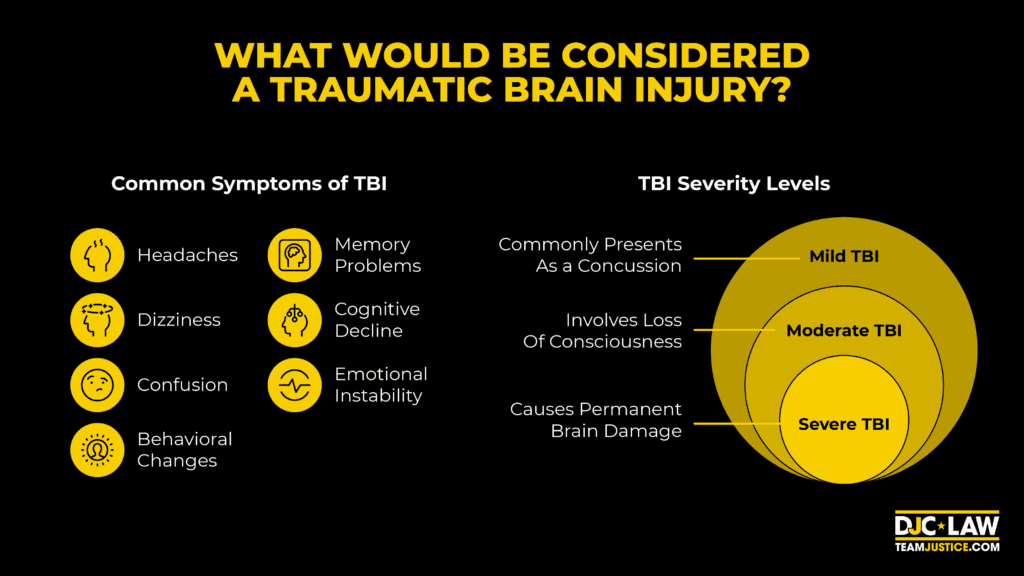
All brain injuries are classified as “traumatic,” hence why relatively mild concussions would still be categorized as a TBI. Both direct and indirect brain injuries fall into this grouping, with even mild brain injuries leading to long-term problems.
Some of the most common symptoms of TBIs include:
Headaches
Dizziness
Confusion
Behavioral changes
Memory problems
Cognitive decline
Emotional instability
However, how do you know if you have a mild TBI or a severe TBI? Here’s a breakdown of the three TBI categories:
Mild – These are the most common TBIs and usually take the form of a concussion. Headaches and dizziness are the most common symptoms. Although medical intervention is necessary, most symptoms tend to resolve themselves within a few weeks.
Moderate – Moderate TBIs are defined by the victim being knocked unconscious. Victims could be unconscious for a few minutes or several hours. Symptoms are more severe, and long-term issues are common without prompt treatment.
Severe – Severe TBIs result in the largest average settlements because these are the blows that cause permanent brain damage. Victims often suffer from cognitive decline, physical issues, and emotional instability. Long-term care is usually required to deal with severe TBIs, and these injuries are – more often than not – considered life-changing.
In all cases, if you believe you have a TBI, seek medical help immediately. Brain injuries aren’t the type that will go away after a long nap.
What Factors Determine Settlement Amounts?
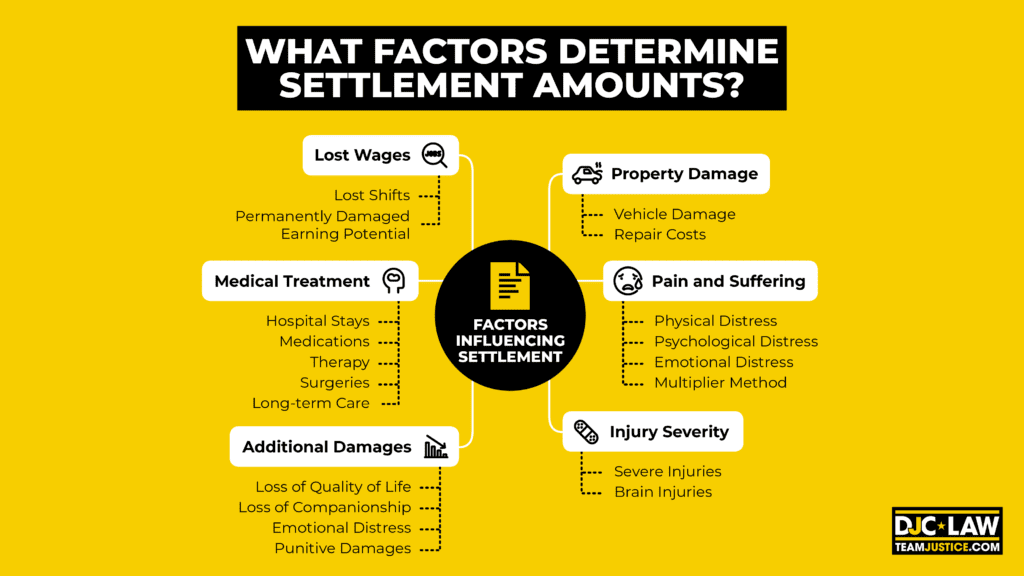
The severity of your injuries, economic losses, and the impact of your injuries on your life are the primary drivers of higher settlement amounts. Settlements are designed to make you “whole” again, meaning greater losses automatically mean larger settlements.
Naturally, determining the impact of each factor is where negotiations often come to a head. Let’s go into the largest factors that will determine your final settlement:
Injury Severity – Severe injuries increase your medical bills, extend your recovery times and result in more pain and suffering. Since brain injuries are far more severe than other types of injuries you might sustain, this is why these cases often result in higher-than-average settlements.
Medical Treatment – Medical costs are the main economic cost and incorporate hospital stays, medications, therapy, surgeries, and other forms of long-term care. If your treatment process is more complicated, your costs will rise.
Lost Wages – The chances are your brain injuries keep you out of the workplace. Every shift lost is an economic cost that can be incorporated into your final salary. Moreover, if your earning potential is permanently damaged, this will also be accounted for.
Property Damage – If your accident resulted in your property, such as a vehicle, being damaged, you can also claim for property damage to address the burden of repairing or replacing these belongings.
Pain and Suffering – Pain and suffering is any form of physical, psychological, and emotional distress arising from your injuries. When the brain is damaged, you can experience pain and suffering in all these areas, resulting in substantial settlement awards. Pain and suffering awards are typically determined using the multiplier method, whereby your economic losses will be multiplied by a number from 1.5 to 5.
Additional Damages – Extra compensation could be awarded as part of your settlement, including loss of quality of life, loss of companionship, emotional distress, and additional punitive damages, according to the judge’s discretion.
In other words, it all goes back to the severity of your injury and how it relates to your economic and non-economic losses. With no cap on potential awards, an experienced personal injury attorney could win you millions.
What Damages Can I Pursue in a Brain Injury Lawsuit?
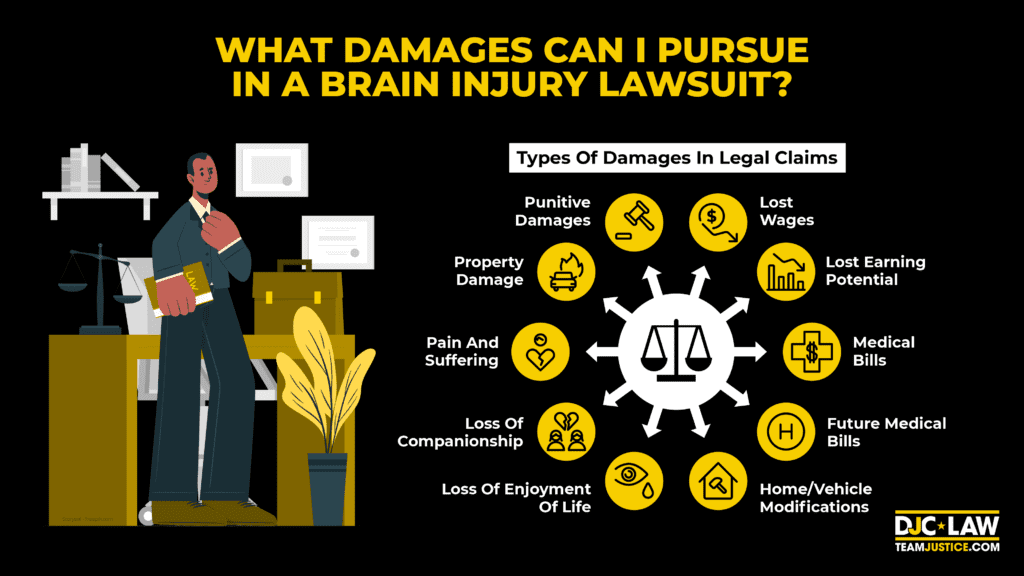
You’re entitled to all damages designed to make you “whole” again physically, psychologically, and emotionally. Damages can be economic, such as bills, or non-economic, like your pain and suffering.
Examples of damages you can pursue include:
Lost wages
Lost earning potential
Medical bills
Future medical bills
Home/vehicle modifications
Loss of enjoyment of life
Loss of companionship
Pain and suffering
Property damage
Punitive damages
Any losses you experienced through the negligence of someone else are entitled to be compensated as part of your final settlement. However, it must be remembered that once you agree to a final settlement, you cannot sue the other party again for the same injuries.
How are TBI Settlement Values Determined?
TBI settlement values follow the multiplier method. The multiplier method uses a factor of 1.5 to 5 and then multiplies your total economic losses to cover the intangible losses you have experienced. It’s the most straightforward measure of estimating case values, but complex cases may mean additional factors are accounted for.
Economic losses in a personal injury lawsuit are relatively straightforward to calculate because your monetary losses are documented. For example, your medical bills, lost wages, and property damage are clear to see, but brain injury cases are more complex.
The issue is that many brain injury victims are left with life-changing issues, meaning it’s necessary to account for their future medical needs and their lost earnings potential. That’s why relying on the general multiplier method alone only serves as a benchmark when calculating settlement values in these cases.
How Do You Prove Traumatic Brain Injury?
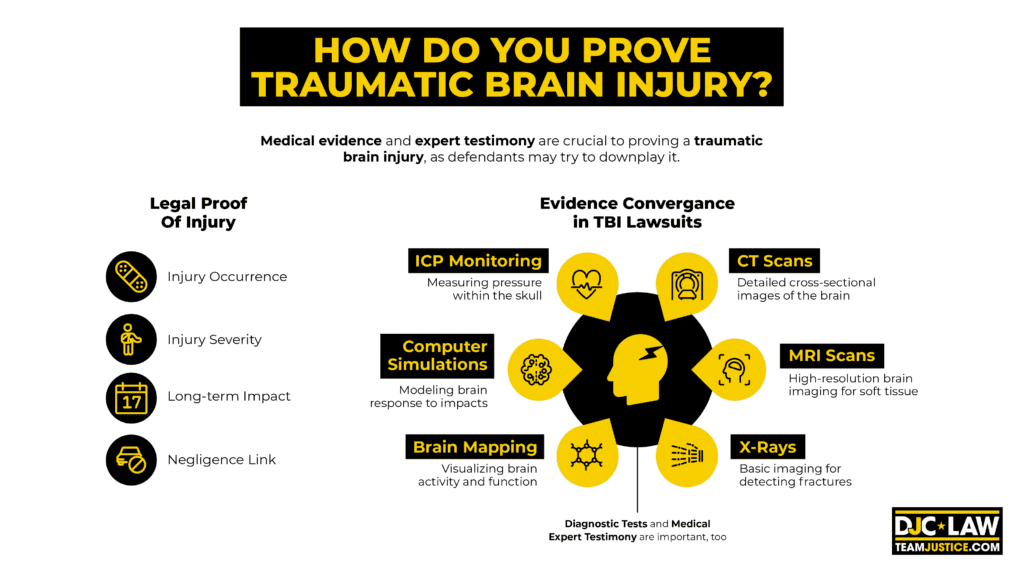
Proving traumatic brain injury requires an array of medical-based evidence and expert testimony. Defendants may attempt to minimize your injuries to reduce how much they have to pay, which is why medical evidence is crucial.
According to the University of Pennsylvania, someone suffers a TBI once every 15 seconds in America. Over half a million people are left disabled because of them. Proving your injuries is the barrier to getting the settlement you deserve.
Let’s examine the four elements you’ll need to prove:
You must first prove that you suffered an injury.
You must prove the severity of your injury.
You must prove the long-term impact of your injury.
You must prove the injury relates directly to someone else’s negligence.
TBI personal injury lawsuits hinge upon specific types of evidence to prove an injury. Examples of medical documentation that can be used to prove your injury include:
CT scans
MRI scans
X-rays
Brain mapping
Computer simulations
Intracranial Pressure (ICP) monitoring
Diagnostic tests
Medical expert testimony
Usually, the barrier to getting a settlement isn’t proving that you have an injury but proving the severity of said injury. Defendants will also use their own medical evidence to attempt to minimize the severity of your injuries and the impact they’ve had on your life.
Should I Accept a Traumatic Brain Injury Settlement?
Negotiating and accepting a TBI settlement is risky because you cannot sue the other party for further damages once you agree to it. Whether it’s worth accepting a settlement depends on how close your settlement is to the predicted judgment value and your chances of winning.
Knowing what a fair settlement is is where a brain injury lawyer comes in because they can use their experience to provide tailored advice on whether you’re getting a fair offer. Remember, the U.S. Bureau of Justice reveals that only 4% of cases ever go to court. It’s in nobody’s interest to go through the time, hassle, and expense of a court trial. On the other hand, the high value of these cases means there’s a higher-than-average chance of your case not being settled but receiving a judgment.
What’s fair compensation is entirely subjective and cannot be quantified. That’s why you need the calm head of an attorney. Essentially, they will compare the settlement offer to a potential court judgment. Moreover, they will weigh up your chances of success in court.
Accepting a settlement is guaranteed, but going to court always involves the risk of losing and receiving far less compensation. So, whether you accept a settlement depends on getting the right attorney and following their advice.
What are the Common Causes of Traumatic Brain Injuries?
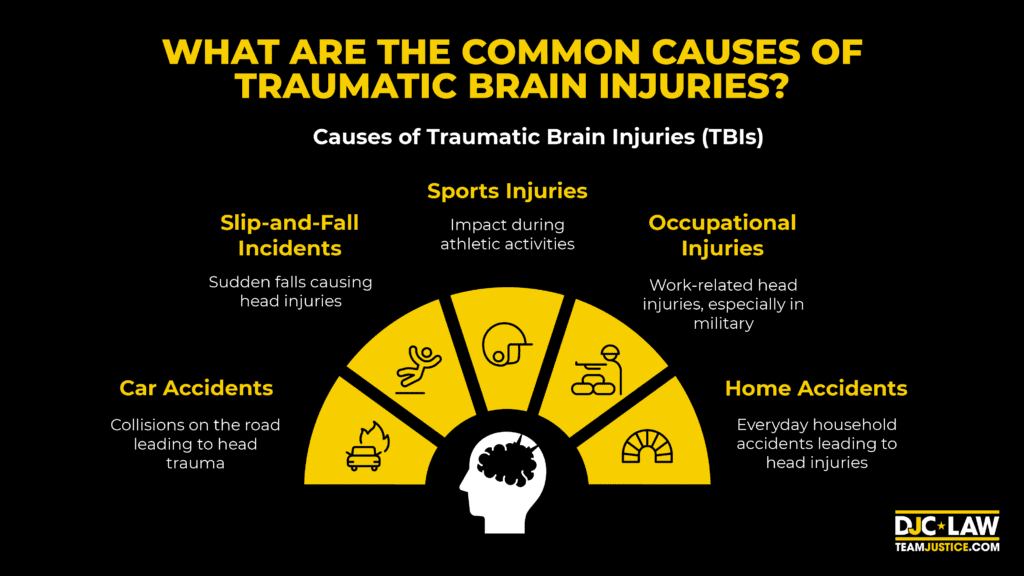
Traumatic brain injuries can arise from any situation where you receive a violent blow or jolt to the head. Any impact to the skull can result in serious damage to the sensitive grey matter within.
Some of the most common causes of brain injuries include:
Slip-and-fall incidents
Sports injuries
Occupational injuries (like being a member of the military)
Accidents in the home
The brain is highly susceptible to injury despite the protective layer of your skull surrounding it. Even a relatively minor blow could result in the brain hitting the inside of the skull, thus resulting in an injury.
That’s why it’s essential to seek immediate medical attention anytime you’re involved in an incident that involves a significant blow to the head.
What is Post-Concussion Syndrome?
The National Institutes of Health defines post-concussion syndrome as the constellation of long-lasting symptoms that occur after mild traumatic brain injuries, such as concussions. Symptoms can last weeks or months, causing significant disruption to the victim’s life.
Remember, you don’t have to lose consciousness to have a concussion or experience post-concussion syndrome. Based on the current science, there’s no link between symptoms and injury severity.
Typically, you’ll experience the first symptoms within seven to ten days, with most people experiencing them for around three months. In some cases, post-concussion symptoms can last for over a year. According to the University of Cambridge, around half of concussion patients still show symptoms six months later.
Symptoms include:
Dizziness
Headaches
Irritability
Anxiety
Fatigue
Difficulty sleeping/sleeping too much
Concentration issues
Memory issues
Tinnitus
Blurred vision
Always seek medical attention if you display any of the above symptoms. Although your symptoms may resolve themselves, untreated TBIs can lead to long-term issues. In the event you do suffer from post-concussion syndrome, this will be factored into your final TBI settlement.
How to Get the Highest TBI Settlement Possible?
TBI settlements are based on facts, meaning you’ll need to gather a mountain of evidence to prove the severity of your injuries. Seeking medical records from your care providers and expert testimony from medical professionals will enable you to put forward your case.
Unfortunately, some plaintiffs derail their own cases due to their actions. Here are just some of the most common mistakes that can impact your settlement:
Not following your doctor’s instructions because you begin feeling better.
Failing to follow your treatment plan thus allows the opposition to minimize the extent of your injury.
Speaking to the other side’s insurer without speaking to a traumatic brain injury lawyer first.
Signing a statement or agreeing to talk about anything other than the facts of the incident.
Jumping at the first settlement offer you receive.
By far, the best thing you can do is hire a specialist TBI attorney. Although you must pay for legal representation from your final settlement, the numbers don’t lie. According to Nolo, plaintiffs who hire a lawyer win around four times as much as those who fight their own cases.
In other words, it’s an investment that more than pays for itself. And with these types of injuries having such a life-changing impact, not getting the settlement you need can make life even more challenging. Speak to a personal injury lawyer after your accident to begin pursuing your case the right way.
Traumatic Brain Injury Settlements FAQs
What is the life expectancy of someone with a TBI?
The life expectancy of someone with a TBI depends on the nature of the injury. According to the CDC, those with moderate to severe TBIs see a significantly reduced life expectancy. Their figures reveal that around 50% of this group will suffer further cognitive decline or die within five years of their injury.
However, not all TBIs mean you’ll see a reduced life expectancy. Those with mild TBIs often recover within a few years without any lingering effects.
What can your traumatic brain injury settlement cover?
Your traumatic brain injury settlement can be used to cover any number of expenses, including medical costs, home modifications, and round-the-clock care. Note that your personal injury lawsuit may already have medical liens or subrogation applied to it for unpaid medical bills. Anything left over can be used in any way that makes the most sense to you.
How long do I have to file a traumatic brain injury lawsuit?
Personal injury lawsuits come with a statute of limitations. Every state sets its own statute of limitations. For example, Texas' personal injury law states you've got a two-year statute of limitations from when your accident occurred. If you fail to file your case in time, you will be barred from claiming monetary compensation.
Avoid falling victim to this time limit by contacting a lawyer as soon as possible and filing your case. The statute of limitations only applies when you file your case, not when the case must be resolved.

